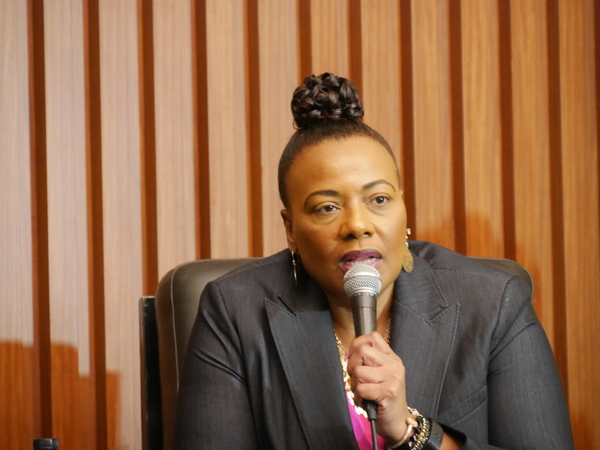 |
|
Bernice King, daughter of the late Martin Luther King, Jr., talks with the South Korean press in Seoul on Mar. 4. (Cho Hyun, religion correspondent)
|
Daughter of the late Martin Luther King, Jr., talks to the Hankyoreh about nonviolence
If the founding spirit of the Republic of Korea is represented by the Korean Declaration of Independence of Mar. 1, 1919, its US counterpart is the “I Have a Dream” address that was delivered by Martin Luther King, Jr., at the Lincoln Memorial in Washington, DC, on Aug. 28, 1963. Under the influence of Gandhi, King organized a nonviolent movement advocating for the civil rights of African-Americans. In 1964, King became the youngest person to be awarded the Nobel Peace Prize at the age of 35. The daughter of this legendary figure, Bernice King, 56, just paid a visit to South Korea. The youngest of two boys and two girls, Bernice King is both a lawyer and a pastor. In 2012, she became the CEO of the King Center, which was established by her mother Coretta Scott King after her father’s assassination, and since then has been officially carrying on her father’s legacy. Bernice King has been running the Nonviolence 365 project to support and develop her father’s nonviolent campaign for civil rights and has been organizing “Students with King” groups to educate people in the principles of nonviolence. The Hankyoreh met King during a press conference that was held at a hotel in Yeouido, Seoul, on Mar. 4. Anger is more toxic to ourselves than it is to other people In Mar. 2018, the King Center hosted an event commemorating the 50th anniversary of Martin Luther King’s assassination, which was attended by former US presidents Barack Obama, Bill Clinton and Jimmy Carter. One of the other people at that event was Lee Young-hoon, senior pastor at Yoido Full Gospel Church, who invited King to visit South Korea. “We need to know that holding in anger is more toxic to ourselves than it is to other people.” When Martin Luther King was assassinated in 1968, Bernice King was just five years old, her daddy’s little girl. “For a long time, it was hard for me to control my anger about that, and I’m still working on that today,” she admitted. “But we have to do our best not to be trapped in that anger, because it first discourages us, and then destroys us.” “I’ve learned how to control my feelings of anger by watching my mother. It’s helpful to think positive thoughts whenever you feel anger rising up and to talk to good people whenever you feel depressed,” King recommended. King took a tour of the demilitarized zone (DMZ), but her first impression was that Korea was “more peaceful and calm than the US.” “I was surprised to see that even the police in Korea don’t carry weapons,” she said. “Since people are free to have guns in the US, there’s a fear that a shooting could happen anywhere and at any time, but that doesn’t seem to be the case in Korea.” Stresses nonviolent dialogue in inter-Korean issues In regard to inter-Korean issues, King emphasized the importance of nonviolent dialogue. “Violence and war cannot be a fundamental solution under any circumstances. In order to tackle the issues faced by South and North Korea, the two sides need to sit down together, communicate and pay attention to each other,” she said. On Mar. 1, King attended an event commemorating the 100th anniversary of the Mar. 1 Movement, during which figures from various religions declared independence with a single voice. When asked about interreligious conflict, King said, “We need to try to understanding our differences, even if that takes a long time. Rather than attempting to change each other, we need to understand and help each other.” “During the ‘hope talk’ I had with young people the day before, there was a question about how Korean churches are losing their positive influence,” King said. “Since churches aren’t just buildings but exist for the sake of people, we need to start communicating with people outside of the church, too, and building good relationships with them.” King also said that young people need to be not only raising issues but also solving them. “In order to address the problems that we face, young people need to take the lead in bringing about change themselves. They’ve got to believe that they need to be the solution and that they can do what’s necessary to accomplish that.” “Because my father regarded his mission as changing the very hard situation and reality in which black people found themselves, he was able to help them confront and resolve that,” King added. As a minister, King belongs to the Southern Baptist Convention, which is regarded as the most conservative Protestant denomination in the US when it comes to issues such as homosexuality. While mentioning the conflict between supporters and opponents of homosexuality inside the Methodist Church, King said, “These difficulties are bound to continue as long as we don’t respect each other or accept our differences.” By Cho Hyun, religion correspondent Please direct comments or questions to [english@hani.co.kr]






